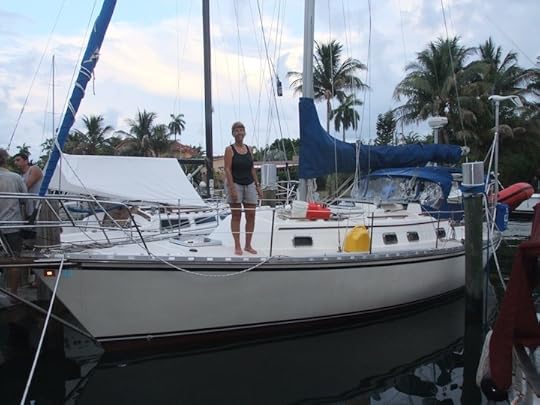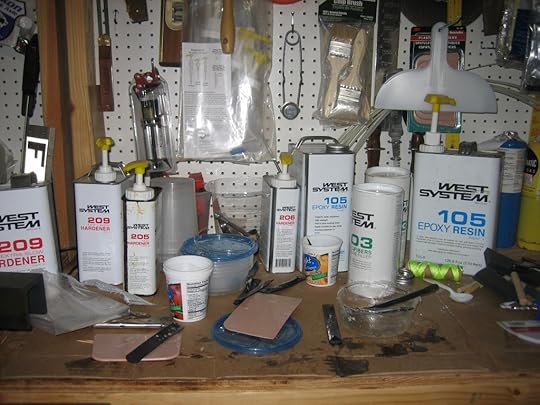Mike Jastrzebski's Blog, page 88
June 19, 2011
What makes a book readable?
By Mike Jastrzebski
I've been reading more lately. I tend to go through streaks where I read one book after another, often staying up until the wee hours to get through one more chapter.
Since I write mystery/thriller novels, that seems to be what I read the most. Sometimes, however, I like to move away from the genre and I'll download a fantasy novel or a sci-fi novel. (Notice I said download. That's because I no longer read paper books.)
I've also found that I'm reading fewer of the writers I used to read and more indie writers. Partly that's because I'm curious about what's selling out there, and partly that's because the traditional publishers have jacked the price on their books up to the point where I no longer buy them, no matter how well I enjoy the writer.
But back to what makes a book readable for me. To answer this question I think I'll attack it from the other direction-what makes a book unreadable.
Poor eBook formatting will make me put a book down and put the author on my don't buy list. Unfortunately, I've found major formatting errors in some of my old favorite writers. I'll overlook a few mistakes, but not many.
I'm actually a little more forgiving on punctuation and grammatical errors, but again too many errors test my patience.
Obvious amateurish ramblings turn me off, and although I don't stop reading a book with long passages of description, I tend to skip those passages and I may hesitate to read another book by the author.
So what's the main criterion for me to keep reading a book and look forward to the next by an author? Action baby.
I want a book that moves along like rocket. I like to see the protagonist hurt a little. Beat him. Shoot him. Kill his friends. That's what I want to see. Don't drag me reluctantly into the next chapter–drag a character there and make me want to follow along.
So what about our readers out there? What makes you stay up into the night reading when you know you've got to get up for work the next morning?
Share on Facebook
June 16, 2011
Never Assume
If you are reading this post it is because I didn't make it to Green Turtle Cay in time in order to write something more substantial. I assumed I would be out of Fort Lauderdale by now, but it is Wednesday evening and we are getting ready to leave in about an hour and I realized, I hadn't ought to assume something will be ready to go by Friday.
Here's tonight's forecast:
South southeast winds 5 to 8 knots becoming west southwest around 5 knots. Seas less than 2 feet. Dominant period 3 seconds. Intracoastal waters smooth. Slight chance of showers and thunderstorms in the evening.
It looks like a long boring motorsail, but I'm not assuming anything. I'll be wearing my harness and the boat is ready for higher winds and bigger seas.
I assumed my boat was ready to go last Saturday and I kissed my son good-bye and motored down to Lake Sylvia. The boat with whom I am buddy-boating for the crossing had just broken their shift cable, so I said I would wait a day. By Sunday afternoon, my batteries were heading south. I called my friends and they said there was an empty slip in their little marina since one boat was in the yard and I could come in. I assumed, I could find the source of my problem.
Well, today is Wednesday and I finally had a professional marine electrician out on the boat today. I thought I had some kind of ground problem. It seemed every time I motored somewhere and then anchored out, my batteries went flat all too soon. I'd cleaned connections, replaced batteries, searched for answers.
Turns out my alternator cable was not attached so it was putting out nada. I'd never checked that. I'd assumed that last year when a dear friend had helped me take the starter off and have it rebuilt that things had got put back to right. I'd just assumed that when I'd been doing all that motoring, I was charging my batteries. I often have been helped by the kindness of friends and I appreciate it, but I can't always assume that all gets done right – either by friends or the pros. I'll find out later this week if the pro was right and that was my only problem.
Lesson learned. Never assume. It was a $200.00 lesson this time. Ouch.
Fair winds!
Christine
Share on Facebook
Inspiration…
For the last few days, I've been stuck on a chapter I was only sort of happy with, and if I'm only sort of happy, I'm not happy. It needed something more, but what that might be, I couldn't quite pin down. I only knew something was missing, and I was determined to find it. But searching for something when you don't know what you're looking for makes for an interesting challenge. Fortunately, I have a boatload of boat repairs, and in recent weeks I've been elbow deep in sawdust and epoxy resins, which, strangely enough, my muses are rather fond of. Of course, trying to hastily transcribe illegible notes in a pad when the pencil is stuck to your resin-covered gloves makes for some interesting reading at the computer later on.
My muses are an amusing, twisted bunch. Sometimes they hold out on me, but rarely for long. Over the years I've discovered the trick to dealing with them. They can't be bullied or badgered into offering inspiration, and the longer I sit, staring in frustration at the monitor, the more uncooperative they become. But when I give in and give them what they want, they return the favor. And what do my muses demand? Recess. A break. They want me to step away from the computer. They want fresh air and a change of scenery. They want to go somewhere that they can wander unrestricted. Sometimes it's a walk with the dogs. Maybe a nap. They'll even surprise me while I'm folding laundry or making dinner, though they'd rather be on the highway, and preferably headed to the beach with the windows down and the music loud. They enjoy working on the boat, and being underway, or anchored somewhere quiet. So whenever I find myself stuck, I step away and give them some breathing space. And I keep my notebook close on hand, because before long, they'll be bombarding me with inspiration. The bottom line; some of my best ideas come when I stop looking. And once again, my muses delivered!
So, everyone, what gets your muses going?
Share on Facebook
June 15, 2011
The Persistence of Memory
Todays guest blogger–C Alex Waln
We are decluttering our house. Or rather, we are removing the meaningless and disrupting the meaningful. We've lived here nearly twelve years. My wife remembers it all, or so it seems. I remember my kidney stone attack on move-in day. Other memories of our tenure here require her to help me excavate. Gradually, my own memory will pull free from the accumulated detritus of my former, rat-racing life. That's if she's had the patience to wait for my emotional archeology.
If she asks me who was handling the foredeck for the Cerripedia Cup 35 years ago, I'll say "Kent" with little hesitation. If she asks me on what tack we finished a particular double-handed, gale-whacked race in 1979, "Starboard with an overide on the genoa primary" leaps forth. Where we ran aground in June '80: New Smyrna… Why do these answers pop from a mental toaster, when other more recent, and perhaps more significant memories don't?
I Logged them. Yes, with a capital "L."
First printed, then cursive, annotated with three and five color sketches in the margins, water stained, rippled in a place or two, fourteen pounds of Logbooks rest on the top shelf of my nearest bookcase. I rarely look in them. They aren't there for reference. They served their principal purpose when I wrote them. Writing them in black and blue and umber engraved the memories on my mind.
No, they are not all engraved to equal depth, some are realistic, some impressionistic, and there is more than one Blue Period as land-life degraded our water-life somehow. There is one period I Logged nothing, zip, nada. Something whispered, even then, however significant the sailing might have been, I didn't want to have broader memories of the time.
The racing Logs started out looking like my lab diaries or my pilot logs. Factual, terse, data-centric, they recorded: been there, done that, tore my t-shirt. And then the tactical coup, the strategic deception, the rainbow, the dolphins started to creep in. Because I knew I would write about these things, I became actively engaged in remembering. Logged data morphed into the declarative; the declarative into stream of consciousness. Now the fraternal twins, exposition and essay, rule the most recent Logs.
Because cruising expanded our navigational boundaries and afforded us generous time to absorb our surroundings, the Logs became more nautical and natural. They became close, sometimes spray-splashed, companions, and I added colors to my pencil palette to sketch Anhinga, and Angus and Gator… My handwriting improved. What I was writing had merit to me; it deserved to be treated meritoriously. I bought better pens than those offered by Monsieur Marcel.
To keep the Logs dry, I bought a hand recorder – a mistake. My observations became a stew of lazy- laconic-lurid. My comments came across as verbal graffiti when I wanted a study, a sketch, I could develop into something memorable. I over-corrected and began to sound like a pilot again. I left the recorder on a marina picnic table with a "Free to a Good Home" sign.
And Weblogs arrived.
Cursive demands a thoughtful rhythm, a pause to consider, a desire not to blot out the hasty. Keyboards make no such demands. A different (higher?) part of my brain is involved when I Log with pen and ink into a book made of tree.
The region that kicks in when I blog with keystrokes stored in something mineral leaves scratches not engravings. Do I blog from a digital platform, of course I do and enjoyably, too. For sharing information and ideas, it's excellent. But after attempts to blog a Log, I realized, for memory's sake, I might as well have been using a white board and a dry-erase marker.
I Log with cursive ink on paper; I still sketch. For persistence of memory, I find it unsurpassed. Is there overlap with blogging? Indeed. But, I Log first because I would most regret having failed to do that. Blogging is usually, intentionally and appropriately, derivative (or not the stuff of memories at all).
After four decades of Logging thusly, I am convinced of three things. Knowing one will be keeping a Log forces one to be attentive and observant. Knowing one will be using pen and ink and bound paper forces one to be thoughtful and deliberate. Knowing others will read of themselves offers one the opportunity to be generous and kind.
Attentive and observant, thoughtful and deliberate, generous and kind memories of a water-life well spent — not bad for something that started as a way to record how fast a chip of wood dragged a knotted line off a reel.
© C. Alex Waln, 2011
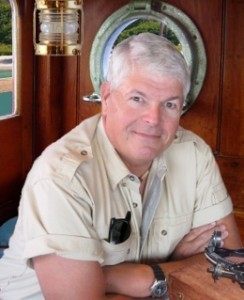
C Alex Waln has been writing and publishing non-fiction since 1971. His Boating Safety, Hurricane Preparation, and Navigation articles have appeared in CRUISING WORLD, OCEAN NAVIGATOR, SEA and other boating and safety industry periodicals. He is an Air Force Veteran and is thrice retired.
He writes of people challenged by the sea, by weather, by crime, and by relationships. He is well equipped to deal with these subjects having sailed for over thirty-seven years on all three American coasts and in Hawaiian and Caribbean waters and having led large diversely populated organizations for forty years.
A Texan currently living in Virginia's Piedmont, with Janet, his wife of four decades, he is working on his fifth novel while preparing to depart on a multi-year sailing adventure. His novels can be found at www.desperateblockhead.com.
Share on Facebook
June 13, 2011
The Other Side of the Fog
by Tom Tripp
The house I currently live in sits on a cliff overlooking Long Island Sound (unfortunately I don't own it; only rent). One of the best things about it is that when the weather changes, I am the first to know, since most of our weather arrives from the west, which means from over the water. Before the recent heat wave, we went through a long, three-week period of oppressive gray, wet weather. For me, the weather was dominated by the fog that hung like a heavy, wet curtain between me and the water.
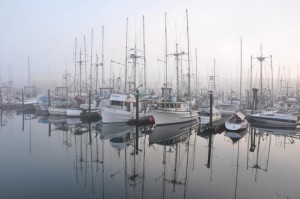
Fog creeps into a Vancouver marina
The day the fog arrived, I noticed that the far Connecticut shore, some 15 miles away, began to fade in the mist. When I looked up again from my work, it was gone, but so was any remaining distinction between sky and sea. And since I live high on that cliff, and my view normally looks down to the sea, it looked as though the fog had taken over all sky, sea and earth and that I was sitting on some dark, wet pinnacle in the clouds.
Maybe it's living in the northeast, but it seems like fog has played a role in many of my ocean-going adventures. When I was in college, my roommate and I were sailing on the Sound at New London when the fog just rolled in and the wind died. Within minutes a deep thrum-thrum-thrum came from somewhere in the fog and we started to panic. Our little wooden boat with its old Dacron sails would never show up on some commercial boat's radar. In the fog, we couldn't determine the exact direction of the sound but it seemed to be coming from our starboard side, from the south. The problem was that there were big ferries from Long Island and even bigger nuclear submarines that routinely came in and out of the nearby Thames River.
We listened to the deep vibration get closer and closer and then pass close off the bow of our becalmed sailboat. We never saw what was in the fog that afternoon but the wake from whatever it was nearly swamped us. We broke out the paddles and swung our boat about 120 degrees to port, figuring we'd hit the beach eventually.
Many years later, I was aboard my own boat, Sunbeam, coming back down the West Passage of Narragansett Bay after a trip up to Fall River. We were headed down to Newport but wanted to go down the West Passage so we could go by the old Quonset Point Naval Air Station, which is now an industrial park, but which had been an active naval base when I trolled for stripers in my grandfather's small boat in the 1960s.
Just as we came abeam of the old carrier piers, the Bay to the south disappeared in a fog wave. The radar was up and running already so it wasn't an immediate problem, but I knew it would get a little dicey when we turned East just north of Jamestown to cross over to Newport. The East Passage is the main north-south route for big tankers headed up to Providence. After turning east, we crept along trying to give ourselves as much time as possible to see and avoid any conflicts.
As we cleared the radar shadow of Jamestown Island, I saw a huge radar return to the south and the ARPA function quickly calculated a northbound course and speed of 13 knots for the target. It had to be a truly big tanker to have such a huge radar return on the screen. I decided to sit tight and let it pass safely in front of us. The fog was condensing on the plastic windscreens of my flybridge, so I had to send someone out to the bow just to get an extra 20 or 30 feet of visibility. When the ship crossed our bow, the fog literally darkened, as though a black hole was crossing our path. Even then, we never actually saw the ship, only its shadow in the fog.
My last encounter with fog at sea happened during a trip from Port Jefferson on Long Island, out to Block Island. It was a beautiful sunny August day on Long Island Sound and Sunbeam was cruising nicely at about 20 knots, eastbound toward The Race, the narrow passage through which all the water of Long Island Sound passes in and out with the tides. The fast-moving waters have scoured deep holes in The Race, where the depths can quickly drop to more than 300 feet.
We turned southeast after passing through The Race and followed a GPS-derived course toward Block Island. It was about a 15-mile leg and there were several other boats around us also heading in that direction. My eye-height above the sea surface aboard Sunbeam was about 13 feet, which meant that I should be able to see the hills of Block Island at about 8 or 9 miles. I could see it on the radar, but as I looked out at the horizon there was just a thin white line where the sky met the sea.
As the distance to the island continued to close I was more and more puzzled about why I couldn't see it. I hadn't seen any fog all day so I wasn't thinking about it, but the thin white line thickened the closer we got. At less than 3 miles from the island, I suddenly realized that I must be looking at a nearly solid wall of fog, behind which, somewhere, was Block Island. It was, in fact, a solid wall and in just a few seconds our world turned from sunny and clear to damp, dark and confining. I yanked the throttles back instinctively, as though I was afraid of hitting a wall. It was that sudden and thick.
A few deep breaths, a reassuring look at the radar, and I moved the throttles forward again, still on course for the island that appeared ahead of us only on radar. We plodded on toward the sea buoy, which I could see on the radar, just where it was supposed to be, but I wondered how we would navigate the entrance to the harbor. A second shock then, as we suddenly exited the dark fog into perfectly clear sunny weather right at the sea buoy. I turned to look at the fog-wall just yards behind our stern and then we negotiated the entrance to the Salt Pond. As I think about it now, I realize I'd never before actually made it to the other side of the fog.
Share on Facebook
June 12, 2011
The Heat
By Mike Jastrzebski
No, I'm not talking about the basketball team. I'm talking about the effect summertime heat has on me down here in Florida.
Now don't get me wrong. I'll take 90 degree summer weather to -20 degree winter weather any day. To be honest though, I don't function well once the temperature reaches that 90 degree mark. It's still beautiful down here, but all I want to do is sit in the shade or better yet in the boat with the air conditioning blasting away.
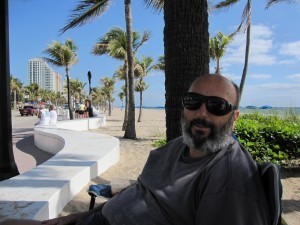
I can't work on the boat. (Okay, I won't work on the boat when it's that hot.) I don't enjoy our walks to the beach as much, and even sitting outside in the cockpit is uncomfortable if there's no breeze.
You would think I'd be getting much more writing done. Well–sort of. I am writing more and Dog River Blues should be ready to publish by the end of July, but I feel lethargic. My mind doesn't work quite as fast as it should. I sometimes have to read a sentence a couple of times before I can decide what needs to be changed or fixed, and I find myself looking for any excuse to put away the computer and pick up a book or turn on the television.
Some people leave the state when it gets this hot. They run away back to wherever they came from. That wouldn't work all that well for us. Minnesota summers can be just as brutal as Florida summers.
So how about all of you out there. How does the heat affect you?
Share on Facebook
June 9, 2011
Which title do you like best? Vote here!
I've been struggling for months now to come up with a title for my new novel. One week one title sounds good, then the next week something else strikes my fancy. I've decided to seek your help.
Here's a quick synopsis of what the book is about:
Former U.S. Marine Maggie Riley is sailing alone in the Caribbean when she rescues a crazy conspiracy-spouting treasure hunter swimming nude off the island of Guadeloupe. She soon learns he is searching for the wreck of the WW II submarine SURCOUF that vanished in 1942. He claims the sub holds millions in gold as well as secret documents that will prove the existence of a powerful inner circle of Skull and Bones. Riley joins the search for the wreck when she discovers her own past intersects the inner Circle of Bones, and this conspiracy nut might not be so crazy after all.
So here's a link to the poll. Please click here and select which title you like best.
Fair winds!
Christine
Share on Facebook
June 8, 2011
67 years ago…
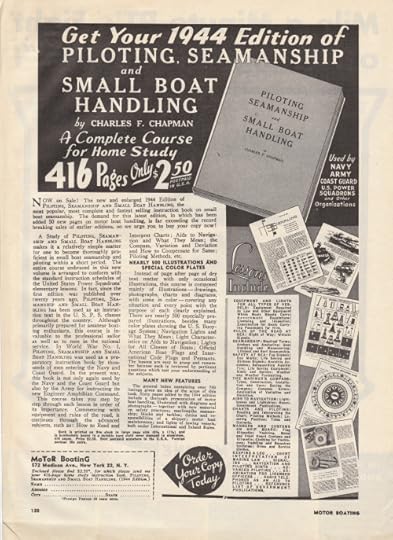
Over twenty years since the first edition offered rules and guidelines for boat handling, navigation, safety, and etiquette, the new and enlarged 1944 Edition of Chapman's Piloting, Seamanship and Small Boat Handling could be yours for the price of $2.50, postpaid in U.S.A. (Foreign postage, add 50c) Through 'World War No. 1′ and 'the present war', Chapman's was used instructional text for military training. Now expanded to 416 pages, with nearly 500 illustrations, the 1944 Edition boasted many new features, sixty pages worth, in fact, on motor boat handling, as well as marlinspike seamanship, blocks and tackles, motor boat maintenance and more.
Present day:
We're up to the 66th Edition of Chapman Piloting, with 928 pages 1,500 full-color illustrations and charts, and all these years later it is still considered the essential guide for anyone operating a boat (not to mention wonderful reading on long winter nights.) But while 1944 was expanding into the increasingly popular use of motor boats, 2011 tackles topics such as computerized four-stroke outboard motors, inboard vectored thrust propulsion systems, joystick controls, VHF/DSC radio, networking electronic devices, features and capabilities of GPS, radar, depth sounder, fish finders, and chartplotters, eLoran system, autopilot and more. I can only imagine what future editions will cover.
(Click on the image and then click again to read all the copy – it's quite fascinating.)
Share on Facebook
June 7, 2011
Summer's Here
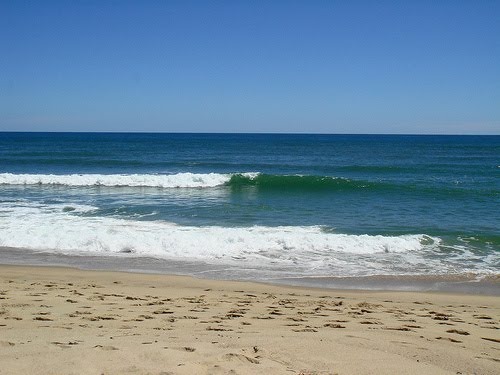
(South Beach, Martha's Vineyard, MA)
After suffering through nine months of hearing wonderful weather reports from my fellow bloggers who hail from southern waters, I can now proclaim the arrival of summer in New England. Budding roses are near the point of blossom. Striped bass are on the bite. And boats are in the water (that is, unless you own the wooden variety….but I'm on a positive riff here so let's go with the can-do attitude and anticipate that old Factor X will be rigged and good to go in the next few weeks).
Around these parts we celebrate the arrival of summer. Some years past, a Martha's Vineyard summer resident named James Taylor put it this way:
Summer's here
I'm for that
Got my rubber sandals
Got my straw hat
Got my cold beer
I'm just glad that it's here
While they may not be the man's most reflective lyrics, the song is about attitude, and after a winter of shoveling 60 inches of snow followed by an absence of spring, attitude is pretty damn important.
So with that winter cold now behind us, it's all bliss and wonderment from here on.
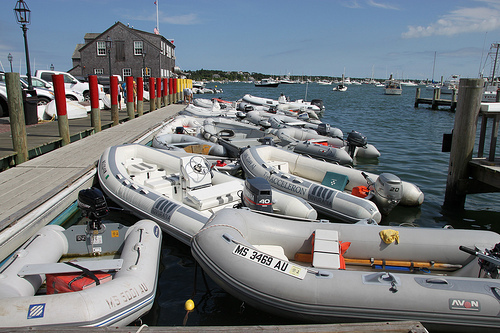
(Edgartown on Martha's Vineyard)
Well, truth be told it's not yet entirely blissful. The air is warm, but the water is still chilly. How chilly, you ask? Here's a scale of water that can be used for the shore in Rhode Island where I spend some time:
June ocean water temps: Ideal for testing the 3/8" neoprene wetsuit you received over the holidays (but remember the booties, gloves and hood).
July water temps: Approved time for filming a remake of the "George at the beach" Sienfeld episode
August water temps: Get in the water and bear it. After all, the air temperature is 102 degrees.
September water temps: Weeks 1 and 2 are perfect for everyone, Seinfeld filming resumes thereafter.
But if you are a local, ignore all of the above. We New Englanders are the proud fools who celebrate a polar bear dunk on New Years Day. We are the loonies who jump into the Gulf of Mexico in January while the natives watch, amused, assuming that we are all from Canada. And we are the ones who take to the water down at Lucy Vincent or by the cliffs of Acquinnah, or from the rock at Warren's Point or along the sands of Charlestown, going natural as we do, just like JT said:
Yeah, the water is cold but I've been in
Baby, lose the laundry and jump on in
I mean all God's children got skin
And it's summer again
And how does this factor into the act of writing? Easy. Come fall, I'll be missing summer and before you know about it I'll be sitting at the keyboard, working away at some fictional story set in my favorite time of the year. But for now? You've got it: summer's here.
Share on Facebook
A Critique Group
Michael Haskins
I was recently approached my magazine editor friend of mine and told of a small critique group on the island and, he said, they'd like me to join. People think of Key West as a literary town, and maybe it is, but I find few published writers here that commingle
with other writers on the island. Maybe they come here to write or unwind and
don't want to be bothered. Nothing wrong with that.
There is a group of writers that meets weekly (I think) but it is more of a circle of friends
and critiques are sometimes hard, especially if you are no in the clique. So, with that experience, I have stayed away from local organizations that tout being writers groups.
I have been working on my fourth in my Mick Murphy Key West Mystery series and really
wanted some honest feedback. I attended a session two weeks ago and observed how the four interacted with each other and how they critiqued each others work. Each writer is expected to bring copies of their writing for everyone to read over. But, the thing that interested me was that each writer read his or her piece and then it was critiqued.
No writer needs the praise of family and friends for he or she has done, what the writer needs is honest feedback. The next week I brought chapter one of Stairway to the
Bottom, the fourth in my series and read it.
I am a believer that you have to read what you write aloud and in doing so you catch words that confuse the reader or are tongue twisters. By attending the group I will come away with two advantages, 1) I get to hear what I write sounds like and 2) I get some honest feed back.
The feedback from my session was good. After I got home, I reread chapter one with the notes given me, and saw that most of the suggested changes made the story move along
better. I didn't find any tongue twister, but I am sure they are in there and I will find some.
I think I will also get something out of critiquing the others' writing and may see things I
do in their writing that doesn't work for any of us.
I am glad that I found this small group and hope it keeps me on my toes, or at least at my
keyboard each day and that reading aloud will be an early benefit since the story is only half way done.
Thank you Mike, Jessica, Elena, and Suzie.
Share on Facebook

